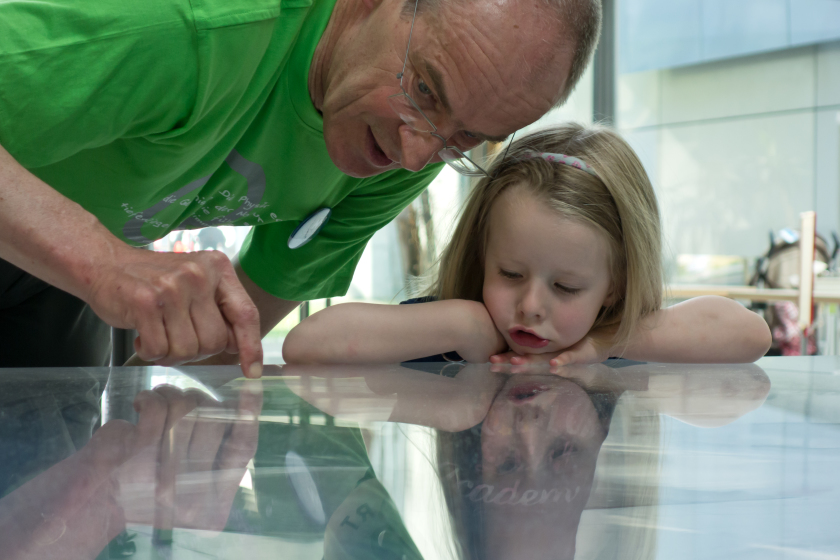Life Time Achievement Award for Roland Müller

Sharing knowledge is a pleasure for Roland Müller. Here he explains to his granddaughter how BESSY II works. © Privat
Accelerator and control systems expert Roland Müller received the ICALEPCS Lifetime Achievement Award. In the more than thirty years of his career at BESSY, the physicist has advanced many projects on control systems at accelerators and has been particularly committed to the international exchange of knowledge.
At this year’s "International Conference on Accelerator and Large Experimental Physics Control Systems" (ICALEPCS) in Shanghai, Roland Müller (HZB) and Andy Götz (ESRF) were jointly honored for their lifetime achievements. The ICALEPCS Lifetime Achievement Award recognizes individuals who have both made significant contributions to their field of expertise and influenced the international practice of control systems development through vision and leadership. This honor is awarded only irregularly, most recently in 2019, and is therefore a special distinction.
Over the past thirty years, Roland Müller and Andy Götz have not only led many important projects in the field of control systems to success at their own research facilities, but have also advanced the exchange in the professional community for control and operation of large physics experiments, i.e. telescopes, fusion research facilities, detectors, and especially accelerators. Thus, through great dedication and organizational skills, they have helped to build ICALEPCS into the landmark conference for control systems at large-scale research facilities.
In his acceptance speech, Müller addressed current demands on research that move him and Andy Götz, in particular the responsibility of science towards society. In consequence acquisition and storage of scientific data must be done according to FAIR principles. Data need to be Findable, Accessible, Interoperable and Repurposable. “Only sharing acquired data allows to look for results, nobody thought about at the moment the experiment was performed. The goal is a truly sustainable exploitation. It will add new scientific values. The rapid progress in fighting the Corona virus gave a glimpse into what can be achieved with a large pool of FAIR data. I am curious to see this evolve.”
Roland Müller has worked at the Berlin electron storage rings BESSY and MLS in the field of control systems since receiving his doctorate in 1988 and has held leading positions in machine operation. He retired in 2019, but continues to contribute his expertise: he is currently working on a digitization concept for BESSY III.
arö
https://www.helmholtz-berlin.de/pubbin/news_seite?nid=23221;sprache=en
- Copy link
-
Fascinating archaeological find becomes a source of knowledge
The Bavarian State Office for the Preservation of Historical Monuments (BLfD) has sent a rare artefact from the Middle Bronze Age to Berlin for examination using cutting-edge, non-destructive methods. It is a 3,400-year-old bronze sword, unearthed during archaeological excavations in Nördlingen, Swabia, in 2023. Experts have been able to determine how the hilt and blade are connected, as well as how the rare and well-preserved decorations on the pommel were made. This has provided valuable insight into the craft techniques employed in southern Germany during the Bronze Age. The BLfD used 3D computed tomography and X-ray diffraction to analyse internal stresses at the Helmholtz-Zentrum Berlin (HZB), as well as X-ray fluorescence spectroscopy at a BESSY II beamline supervised by the Bundesanstalt für Materialforschung und -prüfung (BAM).
-
Element cobalt exhibits surprising properties
The element cobalt is considered a typical ferromagnet with no further secrets. However, an international team led by HZB researcher Dr. Jaime Sánchez-Barriga has now uncovered complex topological features in its electronic structure. Spin-resolved measurements of the band structure (spin-ARPES) at BESSY II revealed entangled energy bands that cross each other along extended paths in specific crystallographic directions, even at room temperature. As a result, cobalt can be considered as a highly tunable and unexpectedly rich topological platform, opening new perspectives for exploiting magnetic topological states in future information technologies.
-
MXene for energy storage: More versatile than expected
MXene materials are promising candidates for a new energy storage technology. However, the processes by which the charge storage takes place were not yet fully understood. A team at HZB has examined, for the first time, individual MXene flakes to explore these processes in detail. Using the in situ Scanning transmission X-ray microscope 'MYSTIIC' at BESSY II, the scientists mapped the chemical states of Titanium atoms on the MXene flake surfaces. The results revealed two distinct redox reactions, depending on the electrolyte. This lays the groundwork for understanding charge transfer processes at the nanoscale and provides a basis for future research aimed at optimising pseudocapacitive energy storage devices.
